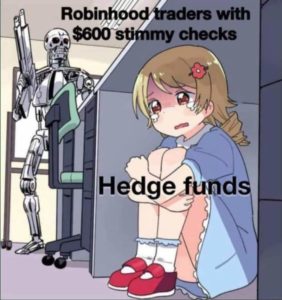In case this is on your mind, I thought I’d write to you about what I see as going on AND explain how/when we use nontraditional investing tools at ProsperiTea Planning. Primarily, you need to know that we are NOT a hedge fund and this does NOT affect you.
What makes something a “hedge” fund? They use additional tools to juice up gains over and above the income you’d get from dividends and interest from the companies and bonds you own. We call these extra tools “derivatives,” as they relate to the price of stocks but not the underlying company themselves. There’s money to be made in derivatives in several ways, for example:
- Side bets on the direction of a company, like shorting a stock*
- Selling someone the OPTION to SELL to you THEIR stock at a later date
- Selling someone the OPTION to SELL to them YOUR stock at a later date
There are sometimes good reasons to BUY options: if you use a raw material in your industry and you want to make sure you lock in a price, buying the option to buy a commodity at a specified price makes your business model work. If you have operations overseas and currency fluctuations could hurt you, there’s a good reason to buy currency hedges. The hedge funds exist to take the opposite side of those bets, selling people insurance and making money off the sale… unless disaster strikes. Then they go bankrupt.
 That just happened with Melvin Capital this week, but the disaster was man-made; a pack of guys on Reddit, following Elon Musk’s lead, decided to chase up the price of GameStop and AMC and Nokia and a few other nostalgic stocks NOT because they think they’re good investments, but because they are enjoying a game of hunting and killing a hedge fund. A lot of them will make money riding this rollercoaster and it’s making the news, but it’s not actually “investing”, it’s something different.
That just happened with Melvin Capital this week, but the disaster was man-made; a pack of guys on Reddit, following Elon Musk’s lead, decided to chase up the price of GameStop and AMC and Nokia and a few other nostalgic stocks NOT because they think they’re good investments, but because they are enjoying a game of hunting and killing a hedge fund. A lot of them will make money riding this rollercoaster and it’s making the news, but it’s not actually “investing”, it’s something different.
The next piece in the news was how some of the discount brokerage firms dealt poorly with their customers, disallowing them to make the trades they wanted to make with the stocks that were in play. Hunting and killing a hedge fund, destroying something like $3 billion in wealth, isn’t actually illegal (yet), but Robinhood and e*trade and a few other platforms shut it down, based at least partly on their allegiance to the large customers. Because you need to notice: if you’re someplace where you pay no fees, you should understand that you’re not the actual customer, right? The no-commission brokerages (including TD Ameritrade) sell something called “order flow” to big customers, which allows them the right to know your bid when buying or selling a stock AND to jump ahead of you in line for the trade, so you end up with a worse price for things by a few pennies.
I’ve talked before about there being a front-end “teller” to the back-end “vault” for your Custodian. The Custodian I mostly use is Pershing, LLC using the front-end of Shareholders Service Group. As a fee-only fiduciary professional, I operate outside the old commission-based model, but the interface into that system, to get a trader onto the trading floor, has SSG acting as our broker/dealer for all intents and purposes.
So it’s good news to you to hear that SSG does NOT sell order flow. We pay a very nominal “ticket” charge for each trade we make (sometimes $0, often $4.95, occasionally $20.) In return, our trade is presented to the market at the same time as the trades for the largest companies in the world. SSG makes their money on having low interest rates on the cash clearing account, on some minor fees here and there like $25 per IRA, and by selling people like me some goods and services (I pay for the Blueleaf feed, for example, as part of my own firm’s overhead.)
I NEVER engage in short-selling. The mantra I’m trained with is “time in the market is better than timing the market”. Another is, “the market can stay irrational longer than you can stay solvent.” I *almost* never use any other derivatives (side bets) in my investing. Here are three places I might:
On occasion, I have sold a “covered call,” meaning I have a stock that we’d consider selling but don’t feel strongly about it. By selling someone the option to buy it if the price moves we make a little bit of money even if it doesn’t change, as we get the income from selling the option. The stock might be “called away” if that price target is hit, at which point we’re obligated to sell it at that price, but if we were fine with selling (because owning the stock doesn’t fit our overall objectives anyway) then covered calls can raise a little cash while we wait for that sale to happen.
Sometimes I’ll put a limit order in for a sale: it’s an easy way to just peg the price we’ll sell at. In these cases I always do it within the normal day-to-day gyrations of the stock price, just to grab it on the upswing moment. There’s a risk the stock could start to crash the second after I put that limit order in, but in practice that has never happened to me, but it could.
I also will do limit orders for a buy once in a while: if we think the stock market is over-valued and someone is hesitant to invest their money, I might leave it in cash but stick a trade order in for when the stock hits a low price. This is risky because you lose all the upside if the stock NEVER drops: you’re stuck in cash watching it soar away. I have a few people with open limit orders from when we had cash sidelined before the election – they are STILL in cash because the expected low price was never offered. That’s as much betting as I ever do, and even then it is something I’d only ever do if the person was really hesitant to get into the market. (We simply cannot predict the future, but something like 51% of the time the market rises each day, so OVERALL it’s better to be in the market sooner rather than later.)
*What is shorting a stock? Here’s an analogy: you RENT a videogame from someone (think Mafia) when it is selling for $30, putting you on the hook for the rental fee plus $30. You then SELL the borrowed game for $30, planning to go buy the game back later (before the rental period is up FOR LESS than $30 because you’re expecting the price to drop. If it drops to, say, $20, then you pay $20 to return the game and pocket the $10 (less the rental cost.) What just happened with Game Stop is the equivalent of people knowing you were playing this game and so they all joined together to buy up all the copies of that game and have now put them up for sale on eBay for $3000 each, so now you have to pay $3000 for each game you sold short for $30. Except now make it be stocks, and now make the price be still going up, and now make it be thousands of games instead of just the one you did this with. This game has a limited upside potential – the stock might go down from $30 to $0, but an unlimited downside potential – the stock could go from $30 to infinity. It’s a stupid game: if the stock doesn’t move at all you’ll be out the trading costs (rental fees in my analogy). It’s only a thing because of hubris: you canNOT know what will happen to the direction of a stock price with any reasonable certainty UNLESS you have insider information OR you engage in illegal manipulation of a stock price.
My conclusions here are:
- The cult of personality that some people have, like Elon Musk hating short sellers, makes it so their personal animosities can become a measurable force in the world when they harness the energies and money of the masses using social media.
- When someone doesn’t charge you to use their services, it’s because you are the PRODUCT, not the customer. These $0 fee trades make up the trading costs someplace. It’s good to consider whether you’re willing to pay the actual cost, as the Robinhood users just did when they were blocked from trading.
- Derivatives continue, as usual, to have very little to do with actual investing, these side bets are mostly unrelated to the functioning of capital markets.
- However, Reddit (and social media in general) has created a new avenue for manipulating stock prices to win at these games in ways that is not yet considered cheating. The bubbles these create, however, will blow over quickly and leave us unharmed.
I hope you find this relieving. I’m fascinated by this train wreck but feel like it’s a safe distance from us.
